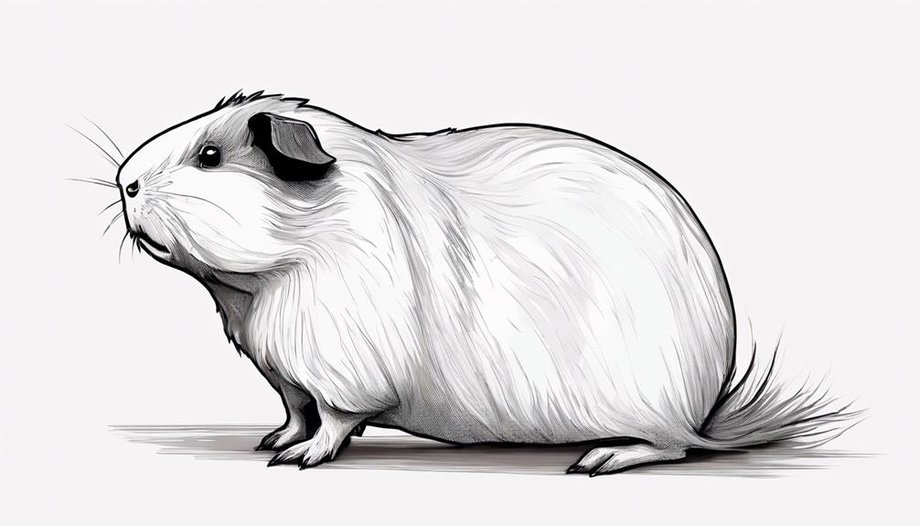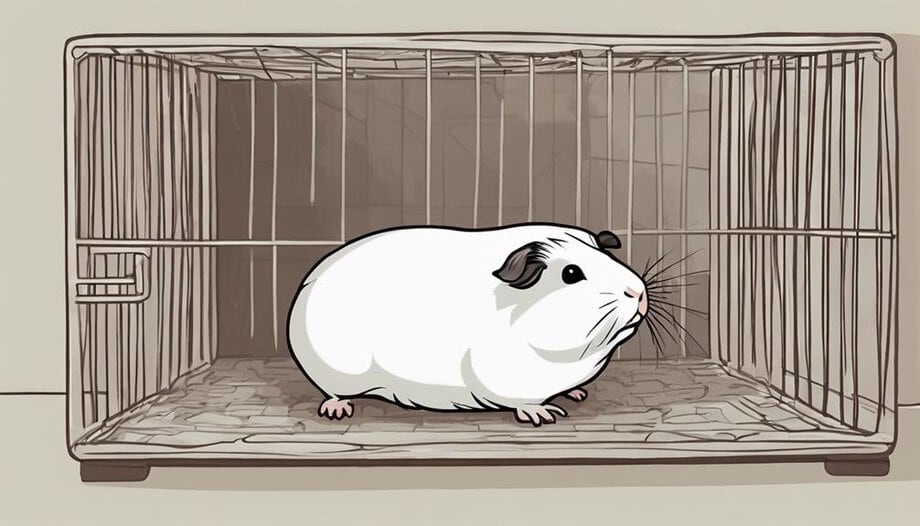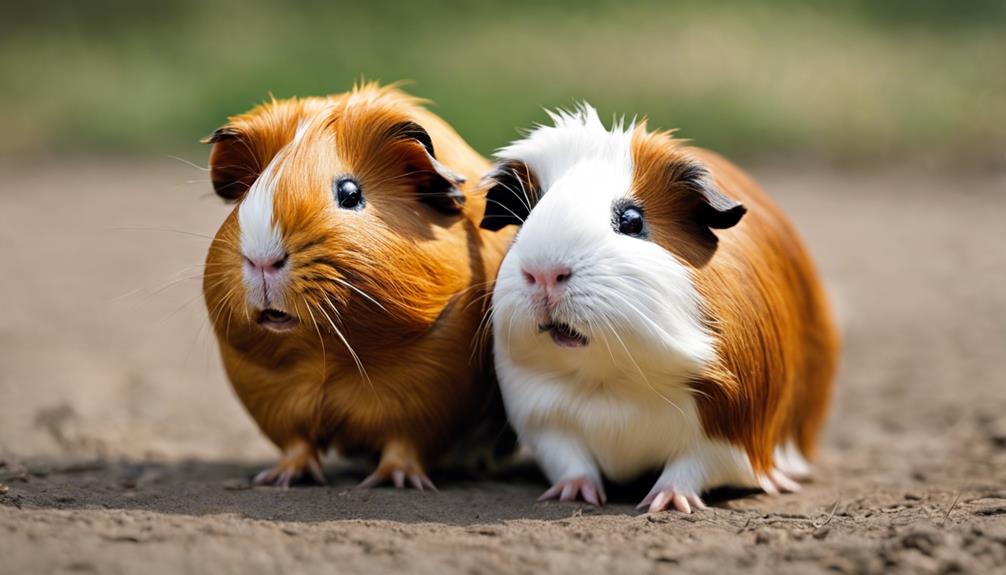What Behavioral Changes Indicate Health Issues in Guinea Pigs?

Behavioral Changes Indicating Health Issues in Guinea Pigs:
Watch for shifts in eating habits, social interactions, and overall demeanor.
These changes can signal underlying health concerns that may require veterinary attention.
Stay observant and proactive in monitoring your guinea pig's behavior for any potential signs of illness.
Key Takeaways
- Unusual eating habits and decreased activity levels signal potential health issues in guinea pigs.
- Abnormal vocalizations like high-pitched squeaks may indicate pain or discomfort in guinea pigs.
- Changes in appetite, water intake, or excessive hiding behavior are significant indicators of health problems.
- Dental issues like overgrown teeth or difficulty chewing can impact a guinea pig's overall health.
Unusual Eating Habits
When guinea pigs exhibit unusual eating habits, it may indicate underlying health issues that require prompt attention. Digestive issues, weight loss, dental problems, and appetite changes are all critical signs to watch for in these beloved pets. Guinea pigs are known for their hearty appetites, so any decrease in food intake should raise concern.
If a guinea pig starts to show disinterest in eating, experiences difficulty chewing, or begins dropping food from its mouth while eating, it could be indicative of dental problems such as overgrown teeth.
Moreover, changes in appetite can also be related to digestive issues. If a guinea pig is suffering from bloating, gas, diarrhea, or constipation, it may lead to a loss of appetite. Weight loss is a serious consequence of prolonged digestive problems that can impact a guinea pig's health. Hence, any unusual eating habits shouldn't be taken lightly, and immediate veterinary attention is essential to diagnose and treat the underlying health issues.
Changes in Activity Level
Changes in a guinea pig's activity level can provide valuable insights into their overall health and well-being. Observing changes in how active your guinea pig is can help you detect potential health issues early on.
Here are some key things worth noting:
- Playful Interactions: A decrease in playful behavior or reluctance to engage in activities they once enjoyed could indicate underlying health problems.
- Sleep Patterns: Changes in sleep duration or disturbances in their regular sleep patterns might suggest discomfort or illness.
- Social Behaviors: Pay attention to how your guinea pig interacts with you and other pets. Unusual withdrawal or aggression could signal health issues.
- Environmental Changes: Any alterations in their environment, such as temperature fluctuations or loud noises, could impact their activity levels. Ensuring a calm and comfortable environment is vital for their well-being.
Excessive Hiding Behavior

Guinea pigs, known for their sociable nature, may exhibit excessive hiding behavior when unwell. Unexplained prolonged hiding or a sudden increase in hiding could signal underlying health issues, prompting a closer look at their well-being.
Understanding these behavioral changes can offer crucial clues to a guinea pig's health status, ensuring timely intervention when needed.
Unexplained Prolonged Hiding
During times of unexplained prolonged hiding, guinea pigs may exhibit excessive hiding behavior as a response to underlying health issues. This behavior can be an indication of distress or discomfort that requires attention and care. When observing a guinea pig engaging in unexplained prolonged hiding, consider the following:
- Social Interaction: Lack of social interaction can lead to stress and isolation in guinea pigs.
- Stress Indicators: Prolonged hiding can be a sign of stress caused by various factors.
- Environmental Changes: Any recent changes in the guinea pig's environment could trigger hiding behavior.
- Behavioral Responses: Understanding how guinea pigs typically behave can help in identifying abnormal hiding patterns.
Being attentive to these signs can aid in providing necessary support and addressing potential health issues promptly.
Sudden Increased Hiding
In response to sudden increased hiding, guinea pigs may exhibit a marked escalation in their hiding behavior, signaling a potential underlying health concern that necessitates attention and monitoring. Behavioral analysis becomes important in understanding the root cause of this behavior.
Guinea pigs are social creatures, and sudden excessive hiding could indicate stress or discomfort. Stress indicators may manifest through increased hiding, as these small animals use this behavior as a coping mechanism. It's essential to observe any accompanying signs such as changes in appetite, unusual vocalizations, or decreased activity levels.
Abnormal Vocalizations
Guinea pigs, typically known for their gentle chirps and occasional squeaks, may exhibit abnormal vocalizations when experiencing health issues.
Unusual squeaks or excessive chattering could be a sign of distress, pain, or discomfort in these small creatures.
Understanding and promptly addressing these abnormal vocalizations is vital in maintaining the well-being of guinea pigs.
Unusual Squeaks
Paying close attention to the distinct sounds emitted by guinea pigs can provide valuable insights into their well-being and potential health issues. Unusual squeaks in guinea pigs may indicate various underlying problems. Here are some key points worth noting:
- Stress induced behaviors, vocalizations: Changes in the pitch or frequency of squeaks can signal stress or discomfort.
- Communication through squeaks, chirps: Guinea pigs rely on vocalizations to express their needs and feelings.
- Pain or discomfort: High-pitched, repetitive squeaks might indicate pain or discomfort.
- Seek veterinary attention: If unusual squeaks persist or are accompanied by other concerning symptoms, it's important to seek guidance from a veterinarian promptly.
Listening attentively to your guinea pig's vocalizations can help in addressing potential health issues promptly.
Excessive Chattering
Excessive chattering in guinea pigs often signifies a departure from their typical vocal patterns and may warrant closer observation for underlying health concerns. When a guinea pig exhibits this behavior, it could indicate various issues such as dental problems, stress, socialization issues, or loneliness.
Dental problems can lead to discomfort, causing increased chattering as the guinea pig tries to cope with the pain. Stress, whether due to changes in their environment or routine, can manifest through excessive vocalizations. Socialization problems or loneliness may also prompt guinea pigs to chatter more than usual, seeking comfort through vocal expression.
Therefore, attentive monitoring and timely intervention are critical when observing excessive chattering in guinea pigs to guarantee their well-being and health.
Aggressive or Irritable Behavior

In instances of health issues, guinea pigs may exhibit a notable shift towards displaying aggressive or irritable behavior. This change in demeanor can be a signal that something is amiss with your furry companion. When observing aggressive or irritable behavior in guinea pigs, it's essential to take prompt action and consider the following points:
- Health Concerns: Aggression or irritability can sometimes be a sign of an underlying health issue that needs to be addressed by a veterinarian.
- Socialization Needs: Guinea pigs are social animals that thrive in the company of others. Lack of proper socialization or dominance hierarchy conflicts can lead to aggressive behavior.
- Environmental Enrichment: Boredom or a lack of mental stimulation can manifest as irritability. Providing environmental enrichment and boredom relief activities can help alleviate this behavior.
- Handling Techniques: Improper handling or stressful interactions can also trigger aggression in guinea pigs. Gentle and respectful handling practices are vital for their well-being.
Breathing Difficulties
When guinea pigs experience breathing difficulties, it is imperative to observe any changes in their respiratory patterns and seek immediate veterinary attention if any abnormalities are noted. Noisy breathing or labored breathing in guinea pigs can indicate underlying health issues that require prompt intervention. These signs could be indicative of respiratory infections, heart problems, or even a blockage in the airways. Guinea pigs are known for hiding signs of illness, making it vital for owners to be vigilant in monitoring their pets for any deviations from normal breathing patterns.
| Signs of Breathing Difficulties | ||
|---|---|---|
| Noisy Breathing | Labored Breathing | Wheezing |
If you notice your guinea pig struggling to breathe, breathing rapidly, or making unusual sounds while breathing, it is essential to act swiftly. Delay in seeking veterinary care can worsen the condition and endanger your pet's life. Remember, early detection and treatment of respiratory issues in guinea pigs can lead to better outcomes and improved quality of life.
Unkempt Fur or Skin Issues

The appearance of unkempt fur or skin issues in guinea pigs can be indicative of underlying health concerns that necessitate prompt attention from a veterinary professional. Guinea pigs are meticulous groomers, so any deviation from their usual grooming habits could signify a problem.
Skin irritations, such as redness, flakiness, or bald patches, may suggest issues like mites infection or fungal infections that require treatment. Addressing these hygiene concerns promptly is vital to prevent any discomfort or further complications for the guinea pig.
Observing the guinea pig's coat regularly and noting any changes in its appearance or texture can aid in the early detection of potential issues. Seeking veterinary advice if you notice any abnormalities in your guinea pig's fur or skin is essential to safeguard their well-being and address any health issues promptly.
Sudden Weight Loss or Gain
Amidst the delicate balance of a guinea pig's well-being, sudden changes in weight can serve as a pivotal indicator of underlying health issues that demand immediate attention. Dietary changes, stress indicators, digestive issues, and behavioral cues are vital elements to take into account when a guinea pig experiences sudden weight loss or gain.
If a guinea pig undergoes a notable weight drop, it might signal an array of health concerns. One common reason is digestive issues, such as dental problems or gastrointestinal disturbances, impacting the animal's ability to consume and absorb nutrients properly. Stress and anxiety can also lead to weight loss, affecting the guinea pig's eating patterns and overall well-being.
On the contrary, sudden weight gain can be indicative of issues like overeating due to boredom or stress, improper diet, or even underlying medical conditions like fluid retention or organ dysfunction.
Observing and promptly addressing any unusual weight fluctuations in guinea pigs is essential in maintaining their health and happiness. By closely monitoring their weight alongside their behavior and diet, caregivers can swiftly identify and address potential health issues, ensuring their beloved pets receive the necessary care and attention.
Frequently Asked Questions
Can Guinea Pigs Experience Mental Health Issues That May Manifest in Their Behavior?
Guinea pigs can experience mental health issues that manifest in their behavior. Anxiety symptoms may include excessive hiding or teeth chattering, while signs of depression could be decreased appetite and lethargy. Recognizing these behavioral changes is important for their well-being.
Are There Specific Signs That Indicate Dental Problems in Guinea Pigs?
When it comes to dental problems in guinea pigs, changes in eating habits and weight loss are key indicators. Observing behaviors like excessive chewing or drooling can also signal potential dental issues that require prompt veterinary attention.
How Can Environmental Factors Impact a Guinea Pig's Behavior and Overall Health?
In guinea pigs, environmental factors play a pivotal role in their well-being. Temperature regulation affects comfort, while lighting and noise levels impact stress response. Understanding these influences can help guarantee a harmonious habitat and promote overall health.
What Role Does Social Interaction Play in a Guinea Pig's Behavior and Well-Being?
In the intricate world of guinea pigs, social interaction is not just a crucial component for well-being; it's an essential element. Play therapy and bonding activities nurture companionship dynamics, enriching their lives and fostering happiness and contentment.
Are There Any Preventive Measures to Help Maintain a Guinea Pig's Mental and Physical Health?
To maintain a guinea pig's mental and physical health, incorporate enrichment activities for stimulation and stress management. Provide proper dietary requirements and establish exercise routines. These measures help secure a healthy and balanced lifestyle for the beloved pet.










